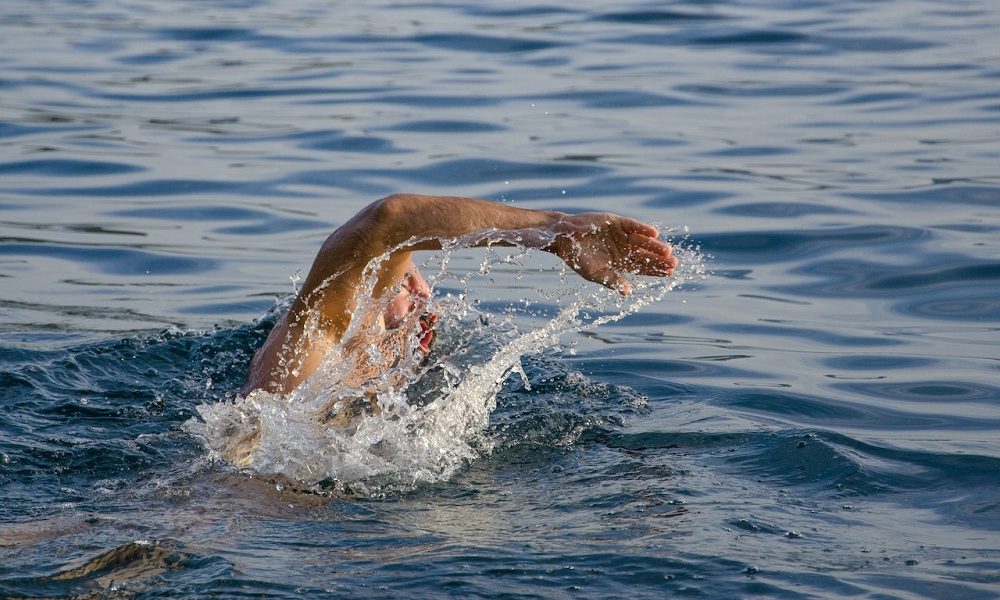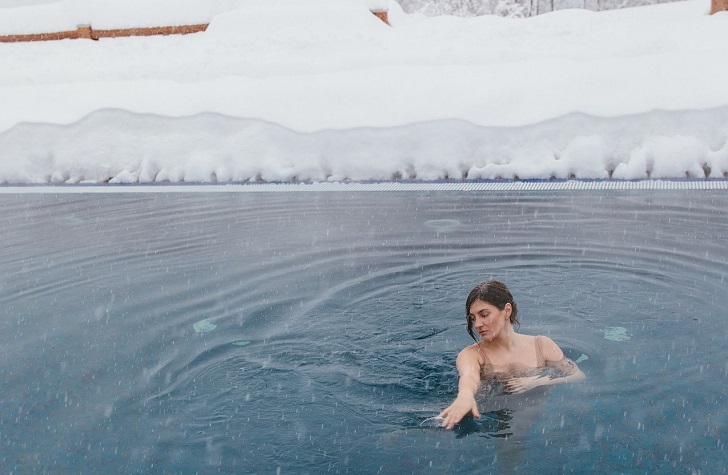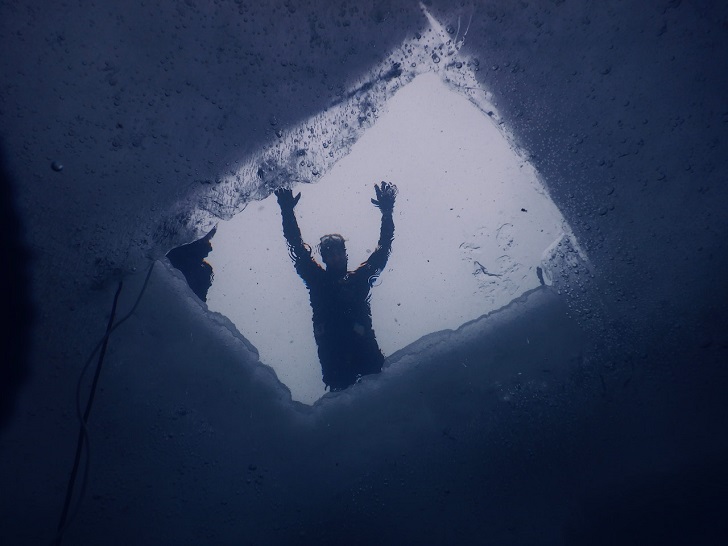
Swimming in Cold Water for Improved Health: How to Do It

As temperatures plummet and waters turn frigid, some individuals embrace the icy plunge for a revitalizing and thrilling experience—a cold-water swim that fosters a unique connection with nature. Yet, along with its exhilaration, cold-water swimming poses challenges and risks that necessitate careful management.
This article delves into the advantages of cold-water swimming while offering crucial guidance to ensure safe and enjoyable experiences.
Advantages of Cold-Water Swimming
Enhanced Immune System: Cold-water immersion is believed to stimulate white blood cell production, fortifying the immune system. Regular exposure may bolster resilience against common illnesses.
Elevated Mood: The shock of cold water prompts the release of endorphins, natural mood enhancers. Many enthusiasts note feeling happier and more relaxed post-cold-water swim.
Improved Circulation: Cold-water immersion boosts blood circulation, benefiting cardiovascular health. Constriction of blood vessels prompts the heart to work harder, potentially strengthening it over time.
Increased Metabolism: Swimming in cold water can rev up metabolism, aiding in calorie burning and potentially supporting weight management.
Stress Reduction: Cold water calms the nervous system, which helps alleviate stress and anxiety. It acts as a natural mindfulness practice, fostering relaxation and mental clarity.
Now, armed with an understanding of these potential benefits, let’s explore how to navigate cold-water swimming safely and effectively.

Yaroslav Shuraev/ Pexels | In cold water, we find clarity, both in the water and in our minds.
Choose the Right Location
Selecting the right location for your cold-water swim is crucial. Look for clean, safe bodies of water like lakes, rivers, or dedicated open-water swimming spots. Avoid swimming in unfamiliar or potentially dangerous areas, and always check local advisories or warnings before entering the water.
Know the Water Temperature
Before you take the plunge, know the water temperature. A water temperature below 50°F (10°C) is considered very cold, and extreme caution is required. Cold water can shock your system, so it’s essential to acclimate gradually.
Acclimate Gradually
Acclimating to cold water is essential to avoid the shock that can lead to cold water shock, which can be life-threatening. Start with short dips or swims in slightly cooler water and gradually build up to longer sessions in colder temperatures. Your body will adapt over time.
Dress Appropriately
Wearing the right gear is crucial for cold-water swimming. Invest in a good-quality wetsuit designed for cold water, and consider additional neoprene accessories like gloves, booties, and a cap to minimize heat loss. A swim cap can also help keep your ears warm and protect them from the cold.

SHVETS production/ Pexels | Wetsuits are not just for warmth; they provide buoyancy and help swimmers stay afloat.
Safety First
Never swim alone in cold water. Always have a swim buddy or someone onshore to watch over you. Additionally, ensure someone knows your swim plan, including your intended route and estimated duration.
Warm-Up Before You Swim
Before diving in, do light exercises or stretches to warm up your muscles. This will help prevent cramping and make your swim more comfortable.
Entry and Exit Carefully
When entering the water, take it slow. Walk in gradually to allow your body to adjust to the temperature. When exiting, move quickly to get out of the cold water and into a warm environment. Have warm clothing and towels ready to wrap yourself in when you’re out.
Controlled Breathing
Control your breathing when you enter cold water. Slow, deep breaths will help you relax and adapt to the shock. Avoid gasping for air, as this can lead to hyperventilation.

Svetlana Obysova/ Pexels | Your comfort zone ends where the cold water begins
Swim Slowly and Stay Close to the Shore
In cold water, your body will cool down faster than in warm water. Swim slower than you would in warmer conditions and stay relatively close to the shore. This allows for quick and easy access to warmth if needed.
Listen to Your Body
Pay close attention to how your body feels during the swim. If you start shivering uncontrollably, experience numbness, or feel extremely tired, it’s time to get out of the water and warm up immediately.
Post-Swim Warm-Up
After your cold-water swim, it’s crucial to warm up properly. Change into dry, warm clothing and sip on a warm beverage like herbal tea or hot chocolate. This will help raise your core body temperature and prevent afterdrop, a condition where your body temperature continues to drop after leaving the cold water.
More in Body
-
`
Are Mono Diets Worth It – or Just a Dangerous Trend?
As summer brings on the pressure to slim down fast, the internet lights up with diet trends promising instant results. One...
August 3, 2025 -
`
Why Motivation Is Essential for Sustainable Fitness Success
Motivation isn’t something that shows up when it’s convenient—it’s something that needs to be built, shaped, and sustained. Many people struggling...
July 27, 2025 -
`
The Mystery of Human Body Parts That Science Still Can’t Solve
The human body is a patchwork of evolutionary choices, quirks, and mysteries. From skeletal structure to the tiniest gland, everything tells...
July 18, 2025 -
`
Why a Mediterranean Diet and Exercise Slow Bone Loss in Seniors
Bone health isn’t just a concern for the elderly—it’s something that starts to matter the moment the body begins to lose...
July 12, 2025 -
`
Want Better Memory? This Diet Could Help Keep Your Brain Sharp
Losing focus, memory lapses, or slower thinking—these aren’t just normal parts of aging. While cognitive changes do happen over time, lifestyle...
July 5, 2025 -
`
The Truth About Health Tracking Apps and Their Impact on Wellness
Scroll through social media or browse the App Store, and you’ll likely spot dozens of health tracking apps. They promise everything—from...
June 29, 2025 -
`
New Study Reveals Alzheimer’s Affects the Entire Body
Most people associate Alzheimer’s with memory loss and cognitive decline, assuming its impact stays confined to the brain. But new findings...
June 21, 2025 -
`
The One Simple Habit Mark Cuban Credits for His Success
Success doesn’t come from shortcuts or luck—it’s built on habits that stand the test of time. Mark Cuban, the outspoken billionaire,...
June 14, 2025 -
`
Thinking of a Detox Diet? Read This Before You Start
Detox diets continue to be one of the most talked-about trends in the wellness space. Whether it’s juice cleanses, tea plans,...
June 8, 2025









You must be logged in to post a comment Login